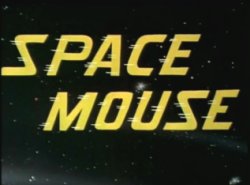
Woody Woodpecker is a cartoon anthropomorphic woodpecker that has appeared in theatrical short films produced by the Walter Lantz Studio and distributed by Universal Studios between 1940 and 1972.

Knock Knock is a 1940 animated short subject, part of the Andy Panda series, produced by Walter Lantz. The cartoon is noted for being the first appearance of Woody Woodpecker, and was released by Universal Pictures on November 25, 1940.

The Woody Woodpecker Show is a long-running 30-minute American television series mainly composed of the film series in animated cartoon escapades of Woody Woodpecker and other Walter Lantz characters including Andy Panda, Chilly Willy, and Inspector Willoughby released by Walter Lantz Productions. The series was revived and reformatted several times, but remained popular for nearly four decades and allowed the studio to continue making theatrical cartoons until 1973 when it shut down. It also kept the Walter Lantz/Universal "cartunes" made during the Golden Age of American animation a part of the American consciousness. The Woody Woodpecker Show was named the 88th best animated series by IGN.

Get Lost is the 68th animated cartoon short subject in the Woody Woodpecker series. Released theatrically on March 12, 1956, the film was produced by Walter Lantz Productions and distributed by Universal-International. The cartoon is based on the well-known fairy tale for Hansel and Gretel of German origin, recorded by the Brothers Grimm.

Real Gone Woody is the 58th animated cartoon short subject in the Woody Woodpecker series. Released theatrically on September 20, 1954, the film was produced by Walter Lantz Productions and distributed by Universal-International.
Buzz Buzzard is a fictional animated character who appeared in several films produced by Walter Lantz Productions in the 1940s, 1950s, 1960s, and 1970s.
The Woody Woodpecker and Friends Classic Cartoon Collection: Volume 2 is a three-disc DVD collection of theatrical cartoons starring Woody Woodpecker and the other Lantz characters, produced by Walter Lantz Productions for Universal Pictures between 1932 and 1958. The set was released by Universal Studios Home Entertainment on April 15, 2008. Included in the set are seventy-five cartoon shorts, including the next forty-five Woody Woodpecker cartoons, continuing the production order from Volume 1. The other thirty cartoons include five Andy Panda shorts, five Chilly Willy shorts, five Oswald the Lucky Rabbit shorts, five Musical Favorites, and ten Cartune Classics.

Ski for Two is the 12th cartoon short in the Woody Woodpecker series. Released theatrically on November 13, 1944, the film was produced by Walter Lantz Productions and distributed by Universal Pictures.

The Dizzy Acrobat is the eighth animated cartoon short subject in the Woody Woodpecker series. Released theatrically on May 21, 1943, the film was produced by Walter Lantz Productions and distributed by Universal Pictures.

Chief Charlie Horse is the 68th animated cartoon short subject in the Woody Woodpecker series. Released theatrically on May 7, 1956, the film was produced by Walter Lantz Productions and distributed by Universal International.

Niagara Fools is the 72nd animated cartoon short subject in the Woody Woodpecker series. Released theatrically on October 22, 1956, the film was produced by Walter Lantz Productions and distributed by Universal International.

Woody Meets Davy Crewcut is the 74th animated cartoon short subject in the Woody Woodpecker series. Released theatrically on December 17, 1956, the film was produced by Walter Lantz Productions and distributed by Universal International.

Red Riding Hoodlum is the 75th animated cartoon short subject in the Woody Woodpecker series. Released theatrically on February 11, 1957, the film was produced by Walter Lantz Productions and distributed by Universal International. The short is based on the fairy tale Little Red Riding Hood, written by Charles Perrault and the Brothers Grimm.

His Better Elf is the 86th animated cartoon short subject in the Woody Woodpecker series. Released theatrically on May 19, 1958, the film was produced by Walter Lantz Productions and distributed by Universal International.

Wacky-Bye Baby is the 28th animated cartoon short subject in the Woody Woodpecker series. Released theatrically on May 2, 1948, the film was produced by Walter Lantz Productions and distributed by United Artists.

The Mad Hatter is the 27th animated cartoon short subject in the Woody Woodpecker series. Released theatrically on February 16, 1948, the film was produced by Walter Lantz Productions and distributed by United Artists.

Woodpecker in the Moon is the 92nd animated cartoon short subject in the Woody Woodpecker series. Released theatrically on July 13, 1959, the film was produced by Walter Lantz Productions and distributed by Universal International.

The first Space Mouse was a comic book character published from 1953 to around 1956 by Avon Publications. Space Mouse was also the name of a 1959 Universal Studios cartoon featuring two mice and a cat named Hickory, Dickory, and Doc. A second Space Mouse character was published by Dell Comics from 1960 to around 1965. The Dell Comics version was also featured in a 1960 cartoon produced by Walter Lantz, entitled The Secret Weapon.

Bye, Bye, Blackboard is the 196th and final animated cartoon short subject in the Woody Woodpecker series. Released theatrically on September 1, 1972, the film was produced by Walter Lantz Productions and distributed by Universal. Walter Lantz then closed down his cartoon studio for the last time.
Pecking Holes in Poles is a Woody Woodpecker cartoon that was released in theaters on March 1, 1972. It is one of the last Woody cartoons that Walter Lantz Productions released into theaters.

















